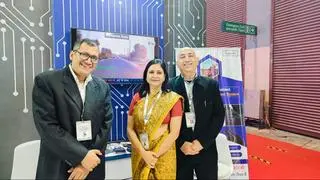With a strong technology background, it was but natural that Prasad Kompalli would want to use his strengths to build something new. He had been the chief business officer at fashion e-commerce company Myntra, which Flipkart bought in May 2014, and he decided to team up with Myntra co-founder Ashutosh Lawania to start a venture that will use technology to make a meaningful impact on people’s lives. The result was mfine, a mobile app-based platform that uses Artificial Intelligence and Machine Learning to provide a ‘virtual doctor’ within 60 seconds for its customers.
“Ashutosh and I are technology guys. We can use technology to build a lot of consumer experience transformation. Last we did was Myntra. It was a pretty good experience in terms of what our learning was and what our impact has been in terms of how we shaped the market,” says Prasad. This time, he adds, when they looked around, they felt healthcare was the closest. The opportunity was big and they wanted to use technology to transform something more than commerce. The impact would be meaningful if they pulled it off.
The idea with mfine was to provide a consumer service that is instantly accessible, just as many other services are on the internet, and do something that can change the experience, according to him. “We said on-demand is the most important part. That is where the mfine thought started,” he says. “At the core of it,” he adds, “mfine is a technology product. It is a kind of a virtual doctor.”
Major healthcare problems
India has two major problems in healthcare, says Prasad. One, there are too few doctors to cater to the population. Two, the doctors are unevenly distributed. Eighty per cent of the doctors cover only 20 per cent of the geography. The number of specialists in any discipline is too small to deal with India’s population. And, even those specialists are in hospitals that are in the large cities. “We looked at this problem and said any meaningful impact can happen only if you solve this problem.”

How does mfine work? Once you download the app on mobile phone, you can create a consultation and tell your symptoms and select the doctor you want to consult. Before the doctor comes online, either through a chat or a video call, the machine itself will ask you a few questions. That is the process where the Artificial Intelligence is taking shape and is in action, explains Prasad. After you mention your symptoms – say, you have fever and throat pain – the machine knows about the other respiratory symptoms. That is what the machine does and prepares the entire case, including a possible line of treatment. Then the doctor comes online and focusses on talking to you and looking at the information he or she has and approving the treatment.
For a machine to even recommend a treatment regimen, you must have gone through huge amounts of data? “We have done millions of medical journals, articles and textbooks and we have developed Machine Learning algorithms that read the symptoms and make a graph. In the graph you know these symptoms are related and when these symptoms occur, this is a possible disease. We know the science and we have taught the machine the science,” says Prasad.
According to him, mfine aggregates only doctors associated with hospitals. It has about 50 hospitals on its network and is able to ensure that every hour of the day, from 7 am to midnight, the platform is up and running.
Revenue model
The company gets its revenues from the customers who download the app and seek a consultation. mfine shares a part of the revenue with the hospital. It charges ₹499 for a consultation with a general physician and ₹699 for super specialities. It has also launched a subscription model where the entire family is covered and can have unlimited consultations with doctors across specialities for either six months or one year. mfine will have digital tools as part of the subscription package that will ensure that medications are taken on time, and conditions such as diabetes are monitored regularly.
The company has a 65-member team, of which 20 are doctors and 25 in technology, including AI and machine learning. The team size will grow as it brings more hospitals and specialities on its platform. It plans to cover 15-20 cities over the next couple of years. It targets to reach a million consumers over the next three years. As more hospitals and specialists are getting on to the platform, mfine accounts for 5-15 per cent of the out-patient business of hospitals. Already, the top 10 hospitals on the network get 10 per cent of their business from mfine.
While there are other ventures that focus on doctor consultations, Prasad says mfine’s strength is its comprehensive solution for both doctors and patients. Thanks to the AI/ML layer, says Prasad, doctors too love mfine, because it provides them with an intelligent assistant. “Others are focussed on connectivity, we are focussing on care,” he adds.








Comments
Comments have to be in English, and in full sentences. They cannot be abusive or personal. Please abide by our community guidelines for posting your comments.
We have migrated to a new commenting platform. If you are already a registered user of TheHindu Businessline and logged in, you may continue to engage with our articles. If you do not have an account please register and login to post comments. Users can access their older comments by logging into their accounts on Vuukle.